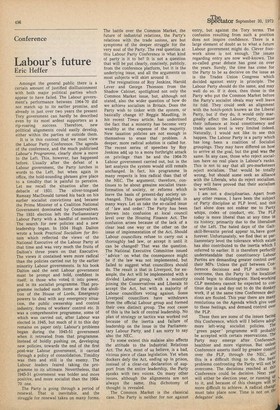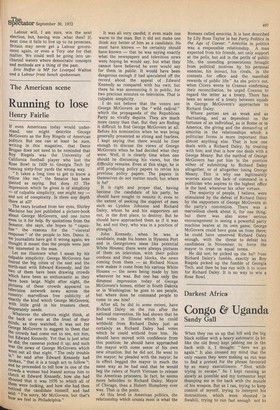Labour's future
Eric Heffer
Amongst the general public there is a certain amount of justified disillusionment with both major political parties which appear to have failed. The Labour government's performance between 1964-70 did not match up to its earlier promise, and already in just over two years the present Tory government can hardly be described even by its most ardent supporters as a rip-roaring success. Therefore, new political alignments could easily develop, either within the parties or outside them.
It is in this context that we must view the Labour Party Conference. The agenda of the conference, and the much publicised Labour's Programme, clearly show a move to the Left. This, however, has happened before. Usually after the defeat of a Labour government, the Party lurches in words to the Left, but when again in office, the bold-sounding phrases give place to a timidity that is painful to perceive. Let me recall the situation after the debacle of 1931. The silver-tongued Ramsay MacDonald turned his back on his earlier socialist convictions and became the Prime Minister of a Coalition National Government dominated by Conservatives. The 1931 election left the Parliamentary Labour Party with a handful of members. The search for new policies and a new leadership began. In 1934 Hugh Dalton wrote a book Practical Socialism for Britain which reflected the views of the National Executive of the Labour Party at that time and was very much the fruits of Dalton's three years on that Executive. The views it contained were more radical than the policies carried out by the earlier minority Labour governments. In his book Dalton said the next Labour government must be prompt and bold, confident in itself, in those who voted it into power, and in its socialist programme. That programme included such items as the abolition of the House of Lords, Emergency powers to deal with any emergency situation, the public ownership and control industry, forms of workers' control etc. It was a comprehensive programme, some of which was carried out, after Labour was elected in 1945, but much of it to this day remains on paper only. Labour's problems began during the 1945-51 government when it retreated from that programme. Instead of boldly pushing on, developing new policies, towards the end of the first post-war Labour government, it carried through a policy of consolidation. Timidity was then and still is the enemy. The Labour leaders feared taking the programme to its ultimate, Nevertheless, that 1945-51 government was bolder and more positive, and more socialist than the 196470 one.
The Party is going through a period of renewal. That is inevitable, and the struggle for renewal takes on many forms. The battle over the Common Market, the future of industrial relations, the Party's relations with the trade unions, are but symptoms of the deeper struggle for the very soul of the Party. The real question at this Labour Party Conference is what kind of party is it to be? It is not a question that will be put clearly, concisely, publicly, from the conference platform, but it is the underlying issue, and all the arguments on most subjects will skirt around it.
The resignations of Roy Jenkins, Harold Lever and George Thomson from the Shadow Cabinet, spotlighted not only the Common Market issue, but, although not stated, also the wider question of how do we achieve socialism in Britain. Does the Party wish to tinker with the system, or basically change it? Reggie Maudling, in his recent Times article, has underlined the fact that a minority has become very wealthy at the expense of the majority. New taxation policies are not enough in themselves to erase that problem. A deeper, more radical solution is called for. The recent series of speeches by Roy Jenkins add up to a more forthright attack on privilege than he and the 1964-70 Labour government carried out, but in the last analysis the system would still remain unchanged. In fact, his programme in many respects is less radical than that of the NEC. The argument, therefore, continues to be about genuine socialist transformation of society, or reforms which leave the basis of present-day society unchanged. This question is highlighted in many ways. Let us take the so-called issue of 'law and order.' The Party has been thrown into confusion at local council level over the Housing Finance Act. The confusion arises because of the lack of a clear lead one way or the other on the issue of implementation of the Act. Should Labour councillors refuse to carry out a thoroughly bad law, or accept it until it can be changed? That was the question. The National Executive Committee issued ' advice ' on what the consequence might be if the law was not implemented, but failed to suggest what councillors should do. The result is that in Liverpool, for example, the Act will be implemented with a divided Labour group, with a minority joining the Conservatives and Liberals to accept the Act, but with a majority of Labour councillors voting against. Some Liverpool councillors have withdrawn from the official Labour group and formed their own distinct group. The root cause of this is the lack of central leadership. No plan of strategy or tactics was worked out because of the inertia and failure of leadership on the issue in the Parliamentary Labour Party, and I am sorry to say also the NEC.
To some extent this malaise also affects the attitude to the Industrial Relations Act. The Act, most of us believe, is a bad, vicious piece of class legislation. Yet when dockers defy the Act, ending up in prison, instead of a clear-cut declaration of support from the entire leadership, the Party speaks with two voices. On many other issues, although the alignments are not always the same, this dichotomy of thought is revealed.
The Common Market is the classical case. The Party is neither for nor against entry, but against the Tory terms. The confusion resulting from such a position does not inspire confidence. There is a large element of doubt as to what a future Labour government might do. Clever footwork alone is not enough. The issues regarding entry are now well-known. The so-called great debate has gone on over the years. Surely, the time has come for the Party to be as decisive on the issue as is the Trades Union Congress which decided against entry in principle. The Labour Party should do the same, and may well do so. If it does, then those in the Party who put the Common Market before the Party's socialist ideals may well leave its fold. They could seek an alignment with the hotch-potch known as the Liberal Party, but if they do, it would only marginally affect the Labour Party, because their influence at local constituency and trade union level is very limited indeed. Naturally, I would not like to see this happen. The Labour Party is a party which has long been a coalition of Socialist groupings. They may have differed on how to arrive at the goal, but the goal was the same. In any case, those who reject socialism have no real place in Labour's ranks. This is not to say that all pro-marketeers reject socialism. That would be totally wrong, but should some seek an alliance with the Liberals, who do reject socialism, they will have proved that their socialism is worthless.
I am not a disciplinarian. Apart from any other reason, I have been the subject of Party discipline at PLP level, and this fact alone does not endear me to Party whips, codes of conduct, etc. The PLP today is more liberal than at any time in its history, primarily due to the liberalism of the Left. The hated days of the Gaitskill-Bevanite period appear to have gone forever. Unfortunately, we find that at parliamentary level the tolerance which exists has also contributed to the inertia which I referred to earlier. It is therefore perfectlY understandable that constituency Labour Parties are demanding greater control over their MPs. Unless the gulf between Conference decisions and PLP actions is overcome, then the Party in the localities could begin to disintegrate. Hard-working CLP members cannot be expected to continue day in and day out to do the donheY work, if at the same time Conference decisions are flouted. This year there are manY resolutions on the Agenda which give vent to these feelings, and demand control over the PLP.
These then are some of the issues facing this Conference, which will I believe adopt more left-wing socialist policies. The 'green paper' programme will probablY be accepted with certain reservations. The Party may emerge after Conference, healthier and more vigorous. But unless, Conference asserts itself by greater control over the PLP, through the NEC, alld this is a difficult thing to do, the basic problems confronting the Party will not 1)e overcome. The decisions reached at this Conference could be decisive. Next yer will either be election year, or running UP to it, and because of this changes will h. more difficult to achieve. A radical chang! must take place now. Time is not on the delegates' side.
Labour will, I am sure, win the next election, but, having won ,what then? If, next time it fails to live up to its promises, Britain may never get a Labour government again, or even a Tory one for that matter. We could well be going into uncharted waters where democratic concepts and methods are a thing of the past.
Eric Hefter is MP for Liverpo/ Walton and a Labour front bench spokesman.











































 Previous page
Previous page